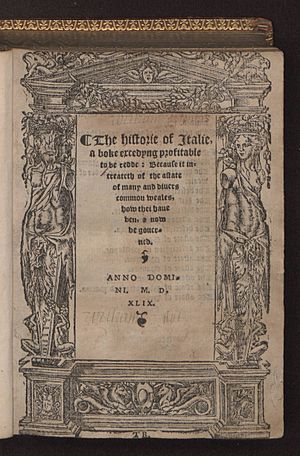William Thomas (MP for Old Sarum and Downton) facts for kids
William Thomas (died 18 May 1554) was a Welsh scholar and politician. He was born in Llanigon, Brecknockshire. William Thomas was an expert in the Italian language and history. He also served as a clerk for the Privy Council during the reign of King Edward VI. His life ended during a political uprising known as Wyatt's Rebellion under Queen Mary I.
Contents
Early Life and Education
William Thomas was from a place called Llanigon. He was the brother of Sir Miles Thomas. Historians believe he was born around 1524. He likely studied at Oxford University, where a person with his name earned a degree in law in 1529.
Time Abroad and Early Writings
Around 1544, William Thomas had to leave his home country, possibly because of his religious beliefs. He spent the next five years living mainly in Italy. In 1545, he was in Venice, handling money for Sir Anthony Browne.
When King Henry VIII died in 1547, William Thomas was in Bologna, Italy. He got into a discussion with some Italian gentlemen and strongly defended King Henry VIII's character and policies. He later wrote down this discussion. An Italian version was published in 1552, titled II Pellegrino Inglese. He also wrote an English version, which is now kept in the British Museum. This work is important because it shows how people in England viewed King Henry VIII right after his death.
From Bologna, Thomas went to Padua. In 1549, he sent an Italian language guide to his friend, John Tamworth. This guide was later published as Principal Rules of the Italian Grammer. It was the first book of its kind in English, helping people learn Italian.
In the summer of 1549, William Thomas returned to England. He was well-known for his travels in France and Italy. He brought another book with him, The Historie of Italie, which was published in 1549. This book was dedicated to John Dudley, Earl of Warwick. Although it was later ordered to be destroyed, it was reprinted several times in the 1560s.
He was also elected as a Member of Parliament for Old Sarum in 1549, but he did not serve for the full term.
Working for King Edward VI
In 1550, William Thomas became one of the clerks for the Privy Council. This was partly because he knew many languages and partly because he had defended the late King Henry VIII. The Privy Council was a group of important advisors to the king.
William Thomas was eager to improve his position. He received income from a church position, even though he was not a religious leader. This decision was criticized by some, like Bishop Ridley.
He received other benefits, including control over tolls in some Welsh towns and a church property in Presteign. In 1551, he was part of a group sent to France to discuss a possible marriage between King Edward and a French princess.
While working for the Privy Council, William Thomas also became a teacher for the young King Edward VI. The king often asked Thomas for his thoughts on government and politics. Thomas wrote many questions and political essays for the king. These writings show how he taught the king about ruling the country. Historians believe Thomas's ideas might even be seen in the king's own journal.
In 1551, Thomas also gave the king an English translation of Josaphat Barbaro's book about his travels to the East. This translation was later published by the Hakluyt Society.
He was also a Member of Parliament for Downton, Wiltshire, in the king's last parliament in 1553.
Political Challenges and End of Life
When Queen Mary I came to the throne, William Thomas lost his jobs and positions. He was part of a group that supported Protestant ideas and opposed Queen Mary's marriage to Philip II of Spain.
He joined Sir Thomas Wyatt's uprising. In December 1553, he traveled to Devonshire to meet with Sir Peter Carew, another leader of the rebellion. When the rebellion failed, Thomas tried to escape but was arrested in Gloucestershire in February 1554.
William Thomas was accused of treason. During his trial, he was found guilty. On May 18, 1554, he was executed. He was known to have said that he "died for his country." His head was displayed on London Bridge.
Later, when Queen Elizabeth I became queen, a law was passed that restored the rights of families whose members had been accused of treason, including William Thomas's family. It is not known if he was married or had children.
Legacy and Contributions
William Thomas was a very smart observer of people and events. He was known for his strong personality. He was also considered one of the most educated people of his time.
His Italian grammar and dictionary were the first of their kind published in English. His book, The History of Italy, was highly respected for its detailed information about the Italian states. All his works are well-organized, and his writing style is clear and easy to understand.
 | Sharif Bey |
 | Hale Woodruff |
 | Richmond Barthé |
 | Purvis Young |


